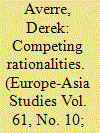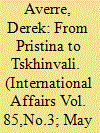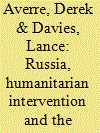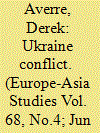| Srl | Item |
| 1 |
ID:
092151


|
|
|
|
|
| Publication |
2009.
|
| Summary/Abstract |
They conclude that, with Russia having taken a different path from the liberal-democratic evolution chosen by Central and Eastern European countries, it is not clear what model of relations Moscow and Brussels should be aiming for (Karaganov & Yurgens 2008, p. 4). Their diverging positions are manifested not only in the increasing difficulties in their bilateral relationship but also in their approaches to the shared neighbourhood. In particular, the conflict between Russia and Georgia over the separatist region of South Ossetia in August 2008-and the criticism by the EU and many of its member states of Moscow's disproportionate reaction and its recognition of South Ossetian and Abkhazian independence-only indicated the shallowness of the putative 'strategic partnership'. Indeed, it led to the conclusion in Brussels that 'relations between the EU and Russia have reached a crossroads'.
|
|
|
|
|
|
|
|
|
|
|
|
|
|
|
|
| 2 |
ID:
088664


|
|
|
|
|
| Publication |
2009.
|
| Summary/Abstract |
This article reviews the main developments in the Kosovo crisis in the context of relations between Russia and NATO/the West. For Moscow, Operation Allied Force constituted a flagrant breach of international law, a threat to post-Cold War European security governance and a challenge to Russia's status in the international order. Official Russian interpretations, heavily influenced by domestic politics, reflect a perception among Russia's political elite that, rather than upholding liberal democratic values, NATO's intervention constituted a selective defence of the interests of the leading western powers.
Such views have influenced Moscow's position on the thorny question of Kosovo's independence and Russia's more assertive foreign and security policy in the recent period, not least in the conflict over South Ossetia in August 2008. Ultimately, Operation Allied Force resulted in the Russian governing elite reassessing its views on statehood, the international order and the norms underpinning international society.
|
|
|
|
|
|
|
|
|
|
|
|
|
|
|
|
| 3 |
ID:
140272


|
|
|
|
|
| Summary/Abstract |
Western analysis perceives Russian approaches to issues of humanitarian intervention and the Responsibility to Protect (R2P) as running counter to western-inspired international norms. This debate has surfaced with some vigour over Russia's policy in the Syria conflict where, in order to protect its strategic interests in Syria, an obstructionist Moscow has been accused of ignoring humanitarian considerations and allowing time for the Assad regime to crush the opposition by vetoing a resolution threatening to impose sanctions. While Russian approaches are undoubtedly explained by a desire to maximize its growing political influence and trade advantages to serve its legitimate foreign policy interests, and while Moscow's attitudes to intervention and R2P exhibit important differences from those of the major western liberal democracies, its arguments are in fact framed within a largely rational argument rooted in ‘traditional’ state-centred international law. This article first highlights key arguments in the scholarly literature on intervention and R2P before going on to examine the evolution of Russian views on these issues. The analysis then focuses on the extent to which Moscow's arguments impact on international legal debates on the Libya and Syria conflicts. The article then seeks to explore how Russian approaches to intervention/R2P reflect fundamental trends in its foreign policy thinking and its quest for legitimacy in a negotiated international order. Finally, it attempts to raise some important questions regarding Russia's role in the future direction of the intervention/R2P debates.
|
|
|
|
|
|
|
|
|
|
|
|
|
|
|
|
| 4 |
ID:
146331


|
|
|
|
|
| Summary/Abstract |
This essay uses the concept of security governance to explore the implications of Russia’s intervention in Ukraine for the rules-based security order in Europe. It outlines key ideas in the literature about the post-Cold War European security order with respect to Russia’s role and examines Russian debates on the Ukraine conflict. It then investigates European institutions’ reaction to the conflict in order to understand to what extent Russia’s exclusion (as a result of the West’s policy of containment and deterrence) or self-exclusion now constitutes a structural factor in the security politics of the wider Europe. The essay concludes with the analysis of the challenges facing both Europe and Russia and considers the prospects for re-shaping this order to give meaning to partnership and shared security governance.
|
|
|
|
|
|
|
|
|
|
|
|
|
|
|
|